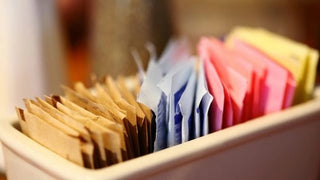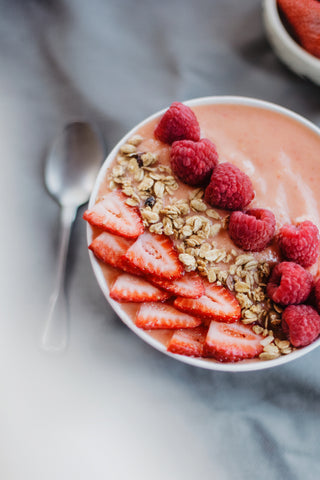Artificial sweeteners are products used to sweeten preparations and, compared to table sugar, add fewer calories to food. In addition, they can be taken into account when starting an eating plan in which the goal is to lose weight, without depriving yourself of the sweet taste.

Substances that are capable of arousing sensations that the mind qualifies as “sweet” are called sweeteners, allowing consumers to enjoy that taste with little energy intake.
"The truth is that sweeteners are a good alternative to reduce the daily calories consumed."
All this goes together with a healthy, complete diet and always controlling excesses, because small doses have not been shown to cause harm.
There is a wide variety of sugar substitutes on the market, which is why it is important to inform ourselves about this issue in order to choose the best alternative.
Stevia: It is a natural sweetener that comes from a plant ( Stevia Rebaudiana ), although what we see in sachets as white powder is no longer natural. The best option is to find that it is 100% Stevia extract. We must review the nutritional label to confirm if it is actually Stevia and in that case it should not have sugars, dextrose, maltodextrin, silica, sodium cyclamate or saccharin, glucose, invert sugar, rice or malt syrup, high fructose corn syrup , aspartame, saccharin, acesulfame K, sucralose or erythrol.
Stevia is 300 times sweeter than table sugar and has a more bitter taste. The most commercial brands are: Truvia, Pure via and Sun crystals, but we recommend you opt for SweetLeaf- Organic Stevia sweetener, which is an organic Stevia extract.
Erythritol : It is a polyol (sugar alcohol) that occurs naturally in certain fruits and other foods such as mushrooms and fermented foods. It is a white crystalline powder with a sweet taste similar to that of sucrose. Erythritol is rapidly absorbed in the small intestine and is eliminated by the body within 24 hours. It has 0 calories per gram, thanks to its absorption and elimination process, without being metabolized.
Bee honey : It is a good natural alternative to sweeten our food, as well as providing enough vitamins, minerals and antioxidants. Honey tends to sweeten more, so we would need less quantity for the preparation of our food.
Sucralose : It is the most used and is found under the name of Splenda. Most light products have sucralose and it is up to 600 times sweeter than table sugar.
Sucralose is obtained from sucrose (common table sugar) which, through chemical changes, hydroxyl groups are replaced by chlorine atoms and this means that it cannot be absorbed in the intestine and as a consequence does not provide calories. It is endorsed by the WHO (World Health Organization) as a safe sweetener.
Aspartame : The best-known brands are Equal and Nutrasweet. It is found in light drinks. It is 200 times sweeter than regular sugar and less sweet than sucralose. If you don't tolerate such sweet foods, it may be the ideal option, although it can cause side effects such as headaches and dizziness.
Saccharin: In some places its consumption has been prohibited because it is related to cancer, although it has not been proven if such a thing is true. If possible it is better to avoid it as it can cause stomach upset. The best-known brands are: Sweet'n low, Sweet twin and Necta sweet and it is 200 to 700 times sweeter than regular sugar.
Acesulfame K: It is 130-200 times sweeter than sucrose. It is not metabolized by the body and is expelled unchanged by the kidneys. It has a sweet flavor that is quickly perceived, good duration and is very stable in food preparation.
The ADI (acceptable daily intake) is the amount taken orally that a person can consume daily in relation to their body weight.
The Joint Expert Committee on Food Additives of the WHO and the Food and Agriculture Organization (FAO) has established the following acceptable daily intake for the consumption of sweeteners:
-
Aspartame: 0-40 mg/kg of weight per day
-
Stevia 0-4 mg/kg of weight per day
-
Sucralose 0-15 mg/kg of weight per day
-
Potassium acesulfame: 15 mg/kg body weight per day
-
Saccharin: 5mg/kg/ of weight per day
Sweeteners can be a good alternative if you are watching your calorie intake, but their excessive use is not recommended, since in the end it is a chemically processed product.
"It is important to have a balance in our diet and only consume the amount that is considered acceptable based on the ADI."





